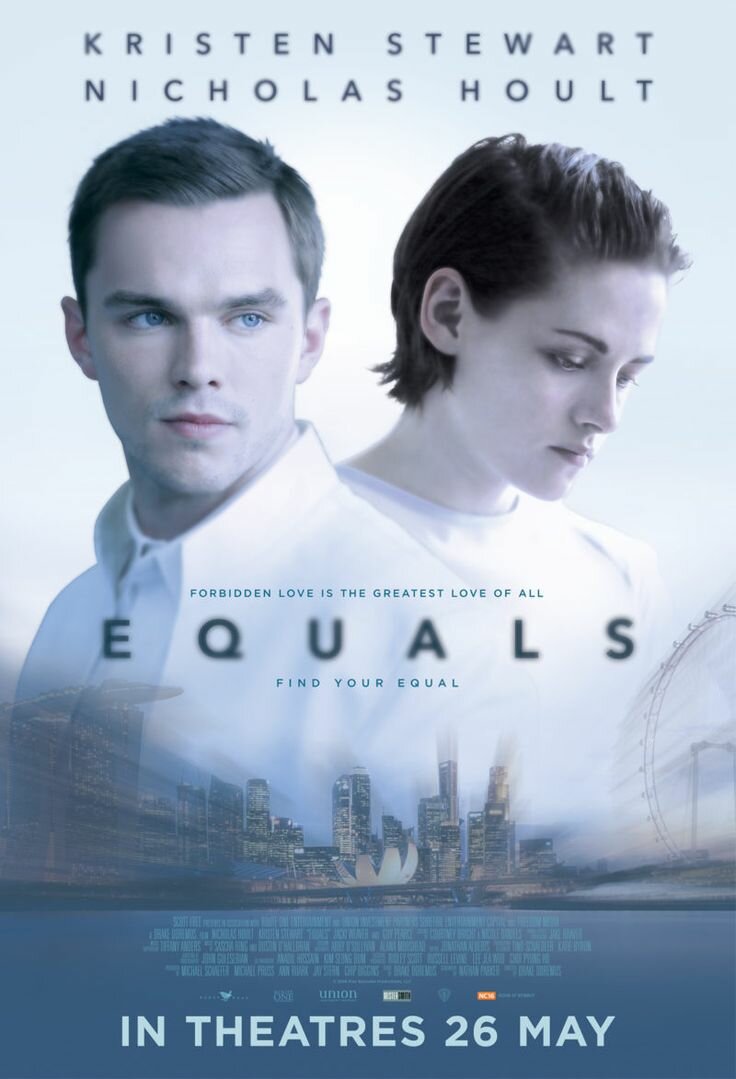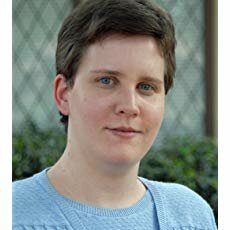On the surface, Equals and Equilibrium have the same premise. Humanity had a horrible war. Emotion itself was blamed, so it is outlawed. In Equilibrium, everyone takes mandatory medication to suppress emotion but is otherwise normal. In Equals, it is implied they do something at birth to suppress emotions, though the process fails periodically. In both societies, there is a totalitarian system that seeks to find the deviants and gets in the way of a couple falling in love. While Equilibrium is a bigger budget film with far more action, I think Equals beats it in a variety of ways.
1. Realistic World-Building
There’s a throwaway line in the announcement of the new cure for emotions in Equals, and it is the statement that this particular treatment is not like the ABC123 treatment. (That isn’t the real alphanumeric, but for the discussion, that doesn’t matter.) We can infer that ABC123 didn’t work because their government continued to fund research and experiment on people to find a better treatment. What was interesting was the public announcement that stated that this treatment isn’t like that one, so they’re addressing skepticism in their population head-on that this one will fail.
Their government doesn’t have gun-kata trained enforcers to hunt down emotional deviants. They have courteous social workers eager to help you, and they’ll believe they’re doing so as they escort you to the treatment center where you’ll remain until you die. The government doesn’t actively murder its emotional citizens. Instead, you’re tied to a gurney and experimented on in the search for a cure for the rest of your life. This reminds me of the sluggish schizophrenia diagnosis slapped on Soviet Union dissidents. It demonizes the dissidents and enforces compliance without scary courts.
Another issue is the manner in which they suppress emotions. If you truly want people to be emotionless all of their lives, the rulers of Equals are far ahead those of Equilibrium. If you treat someone with chemicals at birth, you don’t have to maintain a massive infrastructure for delivering daily medications or worry about enforcement of the medication regimen. Watching Equilibrium, I wonder if a topic in their parenting classes is how to give a squirming baby that daily injection to reduce emotion or part of the school curriculum. This then raises the question of how the average emotionless person handles parenthood. The father in Equilibrium is clearly a bad Dad in that he doesn’t ensure medication compliance with his children despite knowing it could cost them their lives as it cost their mother hers …
Equals has men donate sperm anonymously and women receive it in a sterile environment. It is always a medical procedure instead of an intimate act. Children born alive are taken to the crèche to be raised by trained workers. They don’t burden the average person with children they can’t handle.
In both worlds, the excuse for eradicating human emotion is that there wasn’t just a world war but a world war so bad that most of the planet is uninhabitable. That’s the level of horror you’d need for the survivors to be willing to emotionally drain themselves and set up institutions to lock it into place for future generations. The model in Equals does this better by engineering everyone from birth and breaking up the families that might have countered the “emotion-free” lifestyle.
2. Better Depictions of General Human Nature
Equals has been criticized for being boring and stale. It is true that it isn’t as exciting as Equilibrium with a hidden revolutionary group, shoot-outs, executions and sword fights. Equals centers on a support group of somewhat emotional people in a world where that is mental illness. They’re struggling with the condition and wonder about a cure. Yet they take steps to rescue one of their own and help her escape, despite generally choosing to live in their society instead of committing suicide or escaping themselves.
There’s a minor detail of world building that stuck with me. At the end of the day, people were alone in their uniform cubes, but they had freedom to do what they wanted. Some exercised. And some played games building models in a set period of time. Even with most emotion excised, the system gave them an approved form of mental stimulation and entertainment – play.
Another element of depth was regarding “conception duty.” In Equilibrium, everyone takes emotion-suppressing drugs but people still manage to routinely pair off and make children. This supposes that the desire to have sex and make children would somehow continue in an emotionally crippled world. In Equals, they recognize that this is not the case. They have to order people to show up for conception duty. One key plot point is that the woman cannot travel to the original point for their planned escape because she’s given conception duty. I think there’s another dimension to this.
You don’t give people PSAs unless you’re educating them or convincing them to do something. Their world is clearly educated on biology and history, though they’re warned against couples and love. The answer then is that they have to revoke travel permission for women who are assigned to conception duty because a fair portion of them try to run away to escape it. They don’t want to be subjected to it, whether it is for the emotional aftermath pregnancy could cause, the physical effects, or the high odds in their world of having a freak.
The behavior of the afflicted is surprisingly well-considered. A large percentage of the afflicted in Equals commits suicide rather than face that fate, a very realistic outcome since the alternative is seen as a more painful death. A few try to escape over the years, but few seriously consider it because they recognize how primitive the outside is and the poor odds they as untrained city dwellers would survive there.
In contrast, Equilibrium has rather bizarre decisions made by central characters. If you’re going to skip your emotion-suppressing drugs, why waste it reading mediocre poetry instead of seeking out sex and love? Why would the officer be visibly upset at the order to shoot puppies but not murdering dissidents he’s becoming sympathetic to? And, of course, the kids have figured things out that the dumb adults can’t because awesome but dead Mom taught them, and Dad has to be clueless though he’s a man trained to detect deviants. Another question I had was: why burn the Mona Lisa? If no one feels, why would they invest resources finding and destroying classic art? You could and would want to use the manpower and resources to hunt down dissidents. If you do find it, just lock it in the vault for future historians as they clearly do for some other materials or send for recycling. Literally, no one cares.
3. It Stands Out from the Cruel Totalitarian Model of Emotionless Futures
Equals and Equilibrium are not the only science fiction movies to portray an emotionless future. THX 1138 is the classic example of this trope. You will take drugs to minimize emotion so you’re a perfect cog in the totalitarian system; they even have enforcer droids who look like violent fascist enforcers. The Giver features a world where emotions are suppressed by drugs, and deviants are put to sleep. Dr. Who’s Cybermen and Star Trek’s Borg have their emotional processing shut down for the good of the collective. You will be assimilated, and you won’t care afterward.
In Brave New World, it is almost the opposite of emotionless – you will be happy, and soma ensures it. Everyone, though, will be made compliant through systematic control and supervision. Hedonism is mandated because it interferes with personal attachment and meets other goals of the central planners.
Equals has people struggling with their emotional conditions, sometimes for years, in secret, though some are diagnosed and publicly treated with prescription drugs until they’re too emotional for the drugs to be considered good enough. If the ones hiding the condition are found out, if the afflicted form forbidden emotional relationships, if their behavior is too erratic, they’re sent to a rehab center where they’re test subjects for various cures. In the interim, you can live and work, frowned on but tolerated.
When the new cure is found, the government rolls it out en masse. But they don’t drag in the afflicted kicking and screaming to get it. There’s no need. Through social conditioning and pressure for conformity, many afflicted want it and seek it out. That’s part of the real horror. The emotionless line up to ensure they never feel love, and those whose brains are rebelling against the biochemical oppression let them feel something overwhelmingly opt to get treated because they understand all of the downsides and can’t think of good reasons to remain normal.
Equals shows a general cultural rejection of the power of love that we like to think can cure everything, though (spoiler alert), it still works for the one couple as they finally seek to flee. Others in their society are caught, some choose suicide, and others choose separation rather than risk the unknown together. But by subverting the trope that love saves everyone and everything, Equals stands out as the superior fairy tale.
4. A Truer Ending
Young adults tend to be idealistic. We cater to this impulse today with a wave of utopian political rhetoric and dystopian young adult fiction that ends with “Our maturing young adults have overthrown the oppressive world order!”
Spoiler warning: Equilibrium ends exactly this way with the father overthrowing the evil, hypocritical government, though the ending shot focuses on his daughter’s dawning joy at the realization of what has happened. Even though it is a father protecting himself and his family while fighting for justice, he’s still “shown the way” by his young son subverting the system per the wisdom of their mother. That’s wish-fulfillment for the audience.
Equals is completely different. The young couple, impending parents, choose escape into the unknown. They will likely be free and raise their child outside of this system. However, the system itself continues just fine without them and is likely better locked in place than before. In this regard, Equals truly turns the trope on its head. You can escape and choose a different path, but that doesn’t mean the rest of society can or will follow your lead. But trying to overthrow a system, particularly when many are content with it, can leave you bitter, outraged or just dead. And that’s a lesson that is sorely lacking today.



Comments
Leave a Reply